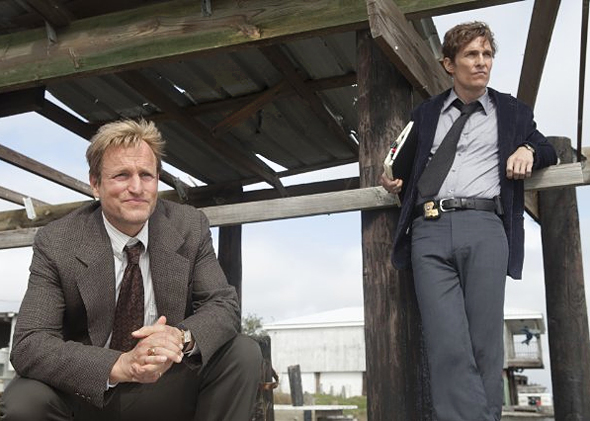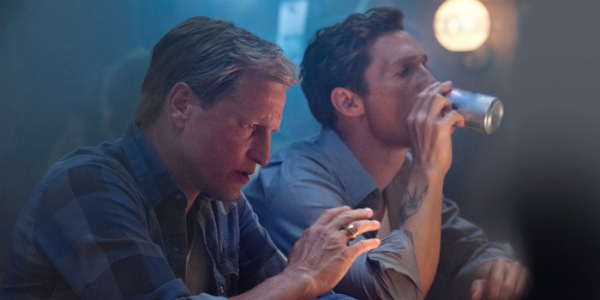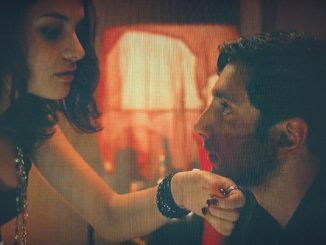
Editor’s note: The following article discusses the series finale of True Detective and contains many spoilers. It is written under the assumption that the reader has watched the entire season. Proceed with caution.
I’ve been wanting to write about True Detective for months now, ever since it’s January premiere. Though I watch my fair share of television, I’ve always been very intimidated by the thought of actually reviewing a series. My plan was to watch the first episode or two, get a feel for the show, and then write sporadic posts throughout the remainder of the short eight-episode season. It wasn’t until viewing the third episode that I finally felt I had a grasp on the characters, the cinematography, and the plot. I decided I would wait until episode four, digest it, then write a mid-season review, followed by another after the finale.
That’s when shit got weird.
Episode four was without a doubt the episode that put True Detective on the map. The series had been simmering for about a month, with three brooding and quietly macabre episodes that HBO’s Vice President for Digital and Social Media referred to as “character study,” followed by a week off so as not to compete with the Super Bowl. This episode was the one where things really took off: It was the first time in which the 2002 interrogation timeline diverged from the actual events of 1995. Woody Harrelson’s character Marty sees his personal life implode while the dangerous man lurking inside of his partner Rust, played by Matthew McConaughey, fully emerges, culminating in an epic and chaotic six minute single-shot scene involving meth-fueled hostage taking and a white supremacist biker crew pushed into war with a rival gang. It was the episode that made people pay attention.
[embedyt]https://www.youtube.com/watch?v=s_HuFuKiq8U[/embedyt]
And boy did they pay attention. Not satisfied with an intriguing plot, gorgeous cinematography, shrewd and often blistering dialogue, and some of the best performances we’ve ever seen by actors in a television series, some of the 11 million viewers that True Detective was now grossing set out to do their own true-detecting and hyper-analyzed every still shot and literary reference. Anything that resembled a clue was closely inspected and churned through a conspiracy-hungry internet apparently starved for another Lost, then spit back out in a form resembling what they hoped it would be, rather than the direction the series was obviously heading. The good folks at io9 really stoked the fire with their piece The One Literary Reference You Must Know to Appreciate True Detective, in which they convincingly pushed a theory involving pagan rites, Satanist Aleister Crowley, and a “weird fiction” collection of short stories entitled The King in Yellow.
I got spooked. Maybe they were right. Perhaps the occultist imagery, bizarre hallucinations suffered by Rust, and references to Voudon were more than mystery and mythological imagery woven into the show for atmospheric purposes as I had supposed. Maybe I was really involved in a television show having no idea what I was actually watching. I wimped out and didn’t write shit.
“It’s as if the caffeine and Adderall-fueled internet masses were given two months to decipher and tear apart in real time David Fincher’s Seven, another noir masterpiece steeped in mystery, religious imagery, and mythology.”
By episode six, though, it was becoming pretty clear that the show was not headed in a supernatural direction. Soon, blog posts about mysticism and a supernatural Yellow King luring his molestation victims to Carcosa with black stars and spirals gave way to wild predictions that one of the two protagonists was actually a real-life Yellow King, well, luring his victims to Carcosa with black stars and spirals. There was speculation that the entire investigation was an intricate scheme devised by Rust for some reason, or that the morally conflicted Marty had molested his own daughter. Maybe Rust Cohl actually planted the body of Dora Lange that he discovered, so as to launch an investigation into a powerful local family.
It’s as if the caffeine and Adderall-fueled internet masses were given two months to decipher and tear apart in real time David Fincher’s Seven, another noir masterpiece steeped in mystery, religious imagery, and mythology. And even though showrunner Nic Pizzolatto repeatedly warned his audience against reading too much into every little clue, stating clearly that neither Rust nor Marty would be the killer, nor would there be any supernatural elements to the show, the conspiracy theories continued to fester.

And then, wouldn’t you know it, the finale came and the very same people who had tried to turn the show into something it wasn’t aired their grievances. “Flawed,” whined People. “Disappointing!” cried The New Yorker. “Predictable,” welped The Washington Post. Exactly. Predictable.
That was the point.
The finale was definitely not perfect, but it did a fine job of wrapping up the story in the spirit of its beginnings. Atmospheric and intense, the story-line follows Rust and Marty as they track down the bad guy, follow him into his Carcosa, and almost give their lives in pursuit of the man who had molested and murdered countless children over the course of several decades in Louisiana. They finished the job they had begun seven episodes (and 20 years) prior. The series never deviated from what it was meant to be: A dark, neo-noir detective thriller focused on two very flawed protagonists. The episode had its weak points: Marty’s revelation about the scarred man’s green ears was, for example, a little flimsy. But it gave his character a decisive investigative role when he had up until that point basically played second fiddle to Rust’s passion and drive. It was a moment of redemption. The final dialogue between the two characters was a little cheesy. But the bond that displayed itself between the two after 20 years of conflict, passion, and discovery beats any conspiracy or plot twist that Pizzolatto could have dreamed up.
The great irony in the mass disappointment is, of course, that even the conspiracy theorists admitted that–on its surface–True Detective appeared to be a simple story. And they went digging for more until there was no possible way that the show could fulfill their exaggerated expectations. And while it may not come close to the ethereal beauty of Six Feet Under, or the pessimistic realism of The Wire, I tend to agree with Ed Morrissey at Hotair when he writes, “True Detective’s finale may have been the most memorably respectful of viewer loyalty in a long time.” Would we rather have another Lost finale? Or maybe a finale that still requires explaining almost a decade after it aired?
Two months after I first decided I wanted to write about the show, I can give an emphatic answer to that question: No. And I can say without a doubt in my mind that I can’t wait for the next season of this anthology.
-Alibi Pierce



Leave a Reply